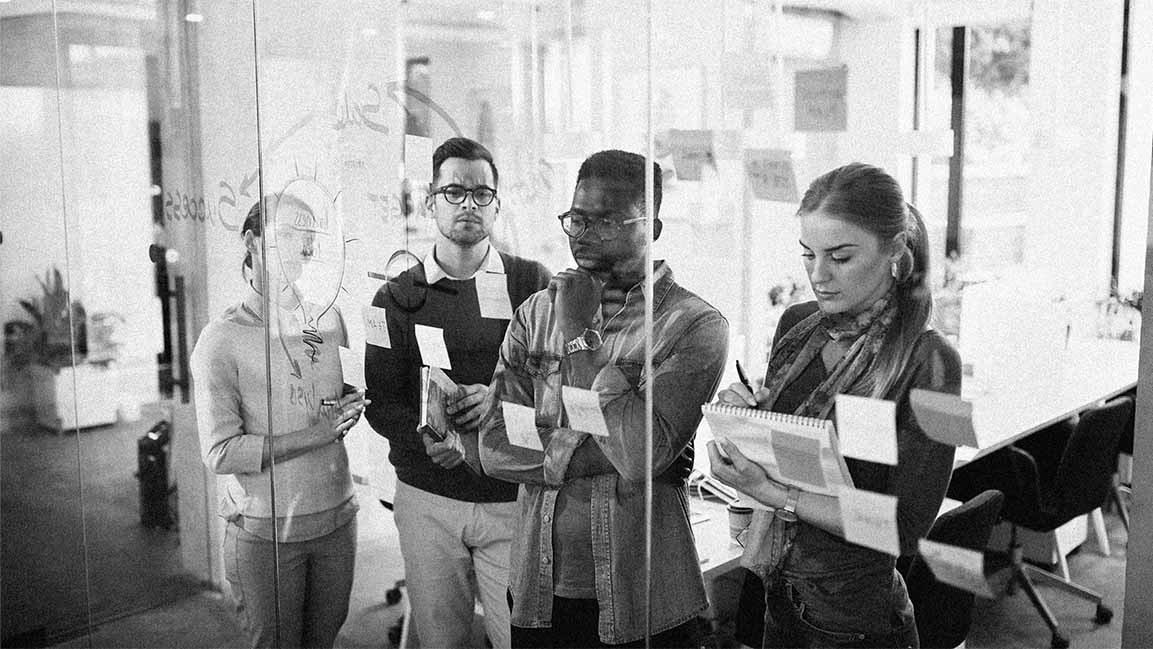- | 10:30 am
Are firms balancing productivity with employee wellbeing in a hybrid world?
Many employees are coping with the end of spontaneous cafeteria conversations in the remote working environment.

For Noora, the short drive to the office, followed by a morning huddle in the conference room, and interactions in the cafeteria or near the water cooler, were typical working days before the pandemic. Work from home was only when bad weather or health prevented her from going to the office.
But, the lockdown, which lasted for a few months, managed to transform remote working into the norm. Countries such as the United Arab Emirates (UAE) and Saudi Arabia tackled the pandemic using digital tools. Life did start getting back on track in the second half of 2020, but now, most of the workforce favors working from their personalized workspaces at home instead of heading back to the workplace.
Other than financial and educational institutions at large, work culture had experienced the most significant transition when restrictions on movement were in force. Now, almost 80% of professionals in the UAE believe that regular workdays have been replaced by flexible working hours for good. Owing to the costs and time saved on traveling daily, along with effective communication, people in the region are reporting a higher level of productivity when they work from home. Or are they?
Even if we consider that 82% in the Emirates and 89% in Saudi Arabia prefer a hybrid working model, where they can work remotely and go to the office occasionally, the flipside is that more than half of the region’s professionals feel overworked.
Since pandemic-induced constraints keep coming back wave after wave (unfortunately), businesses will have to keep reinventing the work culture and offices with the employees’ well-being in mind to motivate them and reduce stress levels.
Just when we all thought that the healthcare crisis was ebbing, another surge of infections has prompted firms in the UAE to either develop hybrid models or return to the work-from-home trend. In contrast, workers take on the new work culture, depending on their priorities.
A WIN-WIN SITUATION FOR EVERYONE?
Even though there is no argument that remote working in cities such as Dubai, where traveling for work can be time-consuming, is an employee’s dream, the same trend favors employers who benefit from increased productivity and reduction in the office footprint. A report by Capgemini suggests that operational expenses can be reduced by one-third, thanks to remote work since less cash is spent on rent, power bills, cooling systems, and maintenance of hardware.
As more than 80% of organizations in the UAE realize that a sizable chunk of their workforce will stick to a mix of remote and on-site work, almost half of them prepare to support this futuristic professional practice. According to Microsoft’s research, about 70% of Emirati businesses have digitized. This transition is primarily driven by cloud adoption so that sharing of data and communication can continue seamlessly in the new normal.
In the same region, Saudi Arabia has also reported that 92% of business leaders in the kingdom prepare to reap the benefits of hybrid work culture, while additional cost benefits of work-from-home drive 78% of Qatari firms.
Two years into the pandemic that brought the world to a screeching halt, remote and hybrid work, backed by high-speed connectivity and communication platforms, aren’t going anywhere.
Even tech giant Google had to push off the return to office in Europe and the Middle East over Omicron-induced chaos.
BUT WHAT ABOUT HUMAN CONNECTIONS?
The screen may look brighter on the other side for many. Still, some aren’t exactly excited about setting up their corner office at home permanently and want to interact with their colleagues in person more often. In addition to stress and burn-out being major concerns caused by the pressure to manage professional and personal responsibilities in tandem, about 59% in the UAE and 51% of Saudis have reported increased workload while operating from home.
For many like Noora, catching up at the cafeteria every morning as a precursor to the daily team meeting remains a missing part of their daily routine. The ease of just walking across the hall to bounce off new ideas or share opinions is absent from the remote working environment.
The comfort of working at home has enabled employees to focus on personal responsibilities, but what’s the impact of reduced human interaction in the long term?
From Qatar, about 83% of managers told Microsoft that they find it challenging to build stronger teams since most people at the workplace may feel disconnected in the remote working environment. For those who had been communicating their opinions, ideas, and instructions simply by walking across the office or calling ad hoc meetings, work has drastically changed in the new normal.
But realistically speaking, things won’t be the same again, and hybrid models focusing on employees and tech integration are the only way forward.
IS TECH UP TO THE MARK?
A smooth shift towards work from home as possible since UAE, Saudi Arabia, and most countries in the Gulf have robust 5G connectivity. For instance, du’s 5G network covers 80% of the UAE, while Saudi Arabia’s Zain has established one of the region’s most extensive networks by 2020. Platforms such as Zoom, Microsoft Teams, and Cisco Webex facilitated virtual conferences and day-to-day communication among colleagues working remotely.
Following the evolution of hybrid work culture, gadgets, including video conferencing bars and room systems that integrate wireless screen sharing with visual communication, are turning larger meeting rooms into low-contact spaces for interaction. Brands such as Zoom Rooms, BlueJeans, and Microsoft Teams Rooms also allow people to participate in meetings in the conference room from remote locations.
Those sharing ideas as part of virtual meetings need to be equipped with headsets that can block background noise and HD cameras for smooth communication. Platforms such as Smarten Spaces also offer digitized floor plans for hybrid offices, enabling managers to allocate desks to employees, along with reports analyzing if employees are comfortable with new workspaces.
PRODUCTIVITY REVOLVES AROUND HEALTH
The changing approach of employees concerning remote work hasn’t gone unnoticed since authorities in the UAE and Saudi Arabia are introducing remote working visas for expats and even launching platforms that’ll allow residents to find freelance work, along with training for the new normal. In addition to measures crafted by policymakers, more than 90% of firms in Saudi Arabia are offering more paid holidays to employees to keep stress in check.
Firms from Saudi Arabia and the UAE that responded to the needs of their workforce, including trust, were ranked among the ten most incredible places to work in the Middle East. At the same time, 42 companies with 57000 employees participated in the Dubai employee health and happiness campaign that highlighted worker wellbeing as a priority.
Among the emirates, Ras Al Khaimah’s tourism development authority offers benefits such as family visas, insurance, school fee, gym memberships, meal schemes, and even flight upgrades. The initiative allows professionals to reach out to the HR department on tough days and receive support that can lift spirits, making most employees feel psychologically and emotionally healthy.
More than half of Saudi Arabia’s professionals felt more emotionally stable due to the comfort of flexible hours and remote working, making a solid case for organizations to prioritize the psychological wellbeing of their employees.
BEYOND THE GULF
Residents are happy to work from home in Gulf states such as the United Arab Emirates, Saudi Arabia, and Qatar, where high-speed connectivity allows them to access affordable mental wellness via platforms such as Takalam and ‘Ask me How I’m Doing.’
But what about Arab countries that are yet to establish a thriving digital infrastructure and are currently facing a financial crisis even before the pandemic disrupted business?
Having started working remotely for firms situated abroad in the 90s, following a civil war that lasted for decades, professionals in Lebanon are using work-from-home as a way to avoid migration, which threatens to drain talent from the country. According to Jobs for Lebanon, a platform that provided career coaching and mentorship and had posted 4000 opportunities in 2020, about 60% of employers wanted remote working professionals.
Apart from inequalities at work caused by uneven access to good-quality internet at home in Lebanon, building a team culture due to restricted interaction among colleagues remains a challenge.
WHAT’S THE WORLD SAYING?
Like peers in the Middle East, professionals in the West also have contrasting views on the future work culture space since some are apprehensive about remote work. This is due to the lack of scope for making human connections and would prefer to go to the office for a few days a week. A few in the US aren’t optimistic about returning to the workplace due to personal reasons. One such unethical reason might include daily lunchtime naps.
But innovative entrepreneurs such as the CEO of the insurance-tech firm, The Zebra, have found solutions such as short zoom calls to replace interactions near the water cooler. At the same time, admit that companies can’t forcefully create a work culture.
Considering the comfort, productivity, and motivation that drives most employees towards remote work, along with the need for emotional stability and in-person human interactions, hybrid workspaces seem like the best bet for companies in the Middle East and beyond.
But the rapid shift towards the online realm has also triggered a cybercrime wave in the Middle East, which includes an attack on Saudi oil giant Aramco, and remains a challenge for firms in the “new normal”.








































